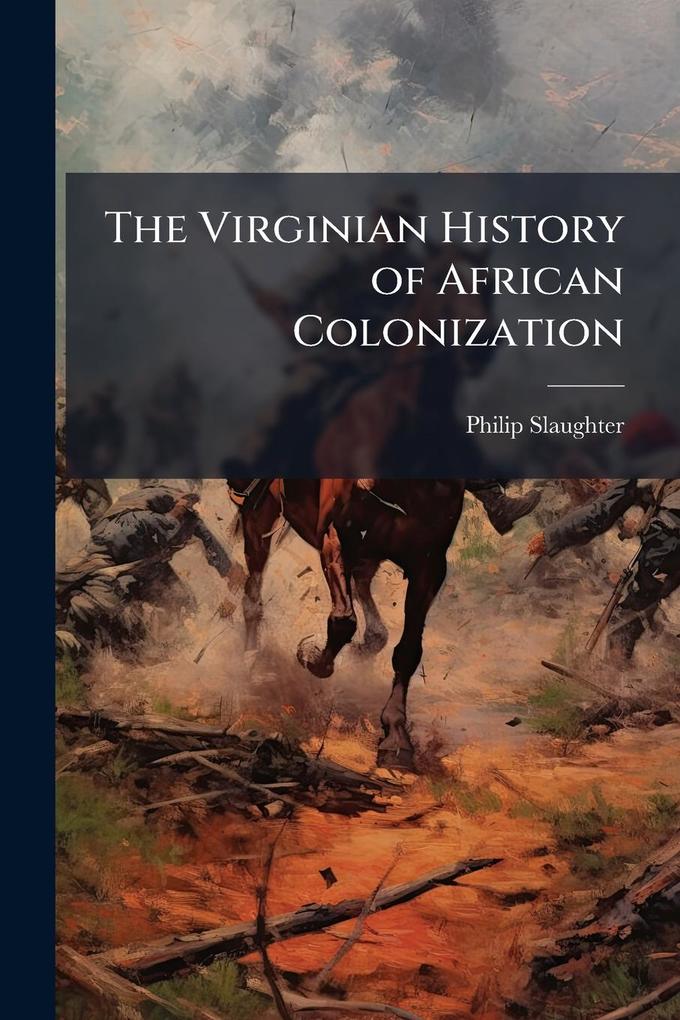
Zustellung: Fr, 01.08. - Mi, 06.08.
Versand in 2 Wochen
VersandkostenfreiBestellen & in Filiale abholen:
"The Virginian History of African Colonization" by Philip Slaughter offers a detailed exploration of the colonization movement from a Virginian perspective in the mid-19th century. This historical account delves into the complex motivations and societal factors that influenced the efforts to resettle free African Americans in Africa, primarily Liberia. Slaughter's work provides valuable insights into the political, social, and economic considerations that shaped the colonization movement and its impact on both America and Africa.
This book sheds light on the prevailing attitudes towards race, slavery, and citizenship during a critical period in American history, just prior to the Civil War. It is an essential read for anyone interested in understanding the historical context of African-American repatriation and its lasting legacies. Through Slaughter's meticulous documentation, readers gain a deeper appreciation of the challenges and complexities inherent in addressing the issue of slavery and its aftermath.
This work has been selected by scholars as being culturally important, and is part of the knowledge base of civilization as we know it. This work was reproduced from the original artifact, and remains as true to the original work as possible. Therefore, you will see the original copyright references, library stamps (as most of these works have been housed in our most important libraries around the world), and other notations in the work.
This work is in the public domain in the United States of America, and possibly other nations. Within the United States, you may freely copy and distribute this work, as no entity (individual or corporate) has a copyright on the body of the work.
As a reproduction of a historical artifact, this work may contain missing or blurred pages, poor pictures, errant marks, etc. Scholars believe, and we concur, that this work is important enough to be preserved, reproduced, and made generally available to the public. We appreciate your support of the preservation process, and thank you for being an important part of keeping this knowledge alive and relevant.
This book sheds light on the prevailing attitudes towards race, slavery, and citizenship during a critical period in American history, just prior to the Civil War. It is an essential read for anyone interested in understanding the historical context of African-American repatriation and its lasting legacies. Through Slaughter's meticulous documentation, readers gain a deeper appreciation of the challenges and complexities inherent in addressing the issue of slavery and its aftermath.
This work has been selected by scholars as being culturally important, and is part of the knowledge base of civilization as we know it. This work was reproduced from the original artifact, and remains as true to the original work as possible. Therefore, you will see the original copyright references, library stamps (as most of these works have been housed in our most important libraries around the world), and other notations in the work.
This work is in the public domain in the United States of America, and possibly other nations. Within the United States, you may freely copy and distribute this work, as no entity (individual or corporate) has a copyright on the body of the work.
As a reproduction of a historical artifact, this work may contain missing or blurred pages, poor pictures, errant marks, etc. Scholars believe, and we concur, that this work is important enough to be preserved, reproduced, and made generally available to the public. We appreciate your support of the preservation process, and thank you for being an important part of keeping this knowledge alive and relevant.
Produktdetails
Erscheinungsdatum
22. Mai 2025
Sprache
englisch
Seitenanzahl
142
Autor/Autorin
Philip Slaughter
Verlag/Hersteller
Produktart
kartoniert
Gewicht
209 g
Größe (L/B/H)
234/156/8 mm
ISBN
9781023865807
Bewertungen
0 Bewertungen
Es wurden noch keine Bewertungen abgegeben. Schreiben Sie die erste Bewertung zu "The Virginian History of African Colonization" und helfen Sie damit anderen bei der Kaufentscheidung.









